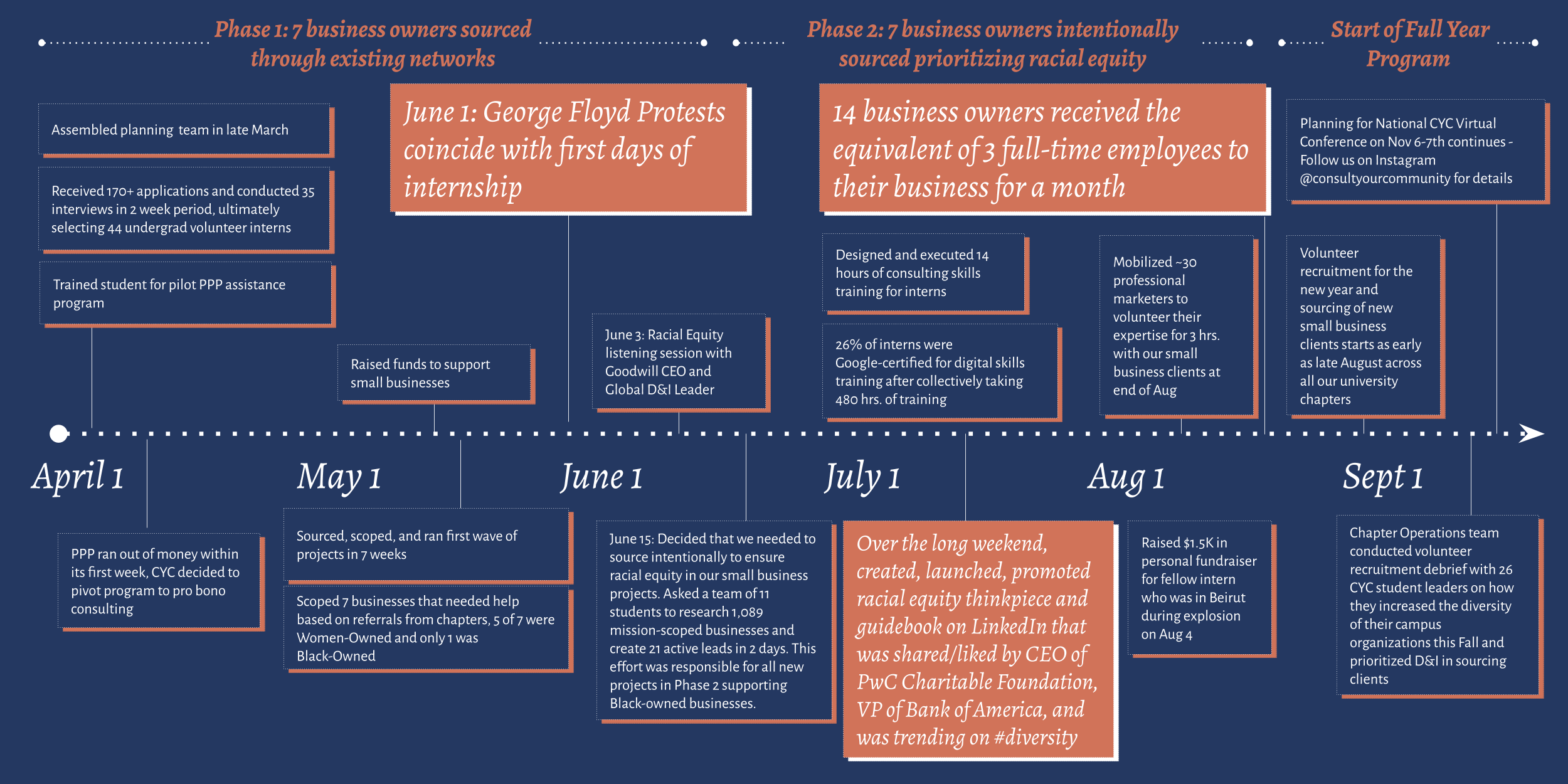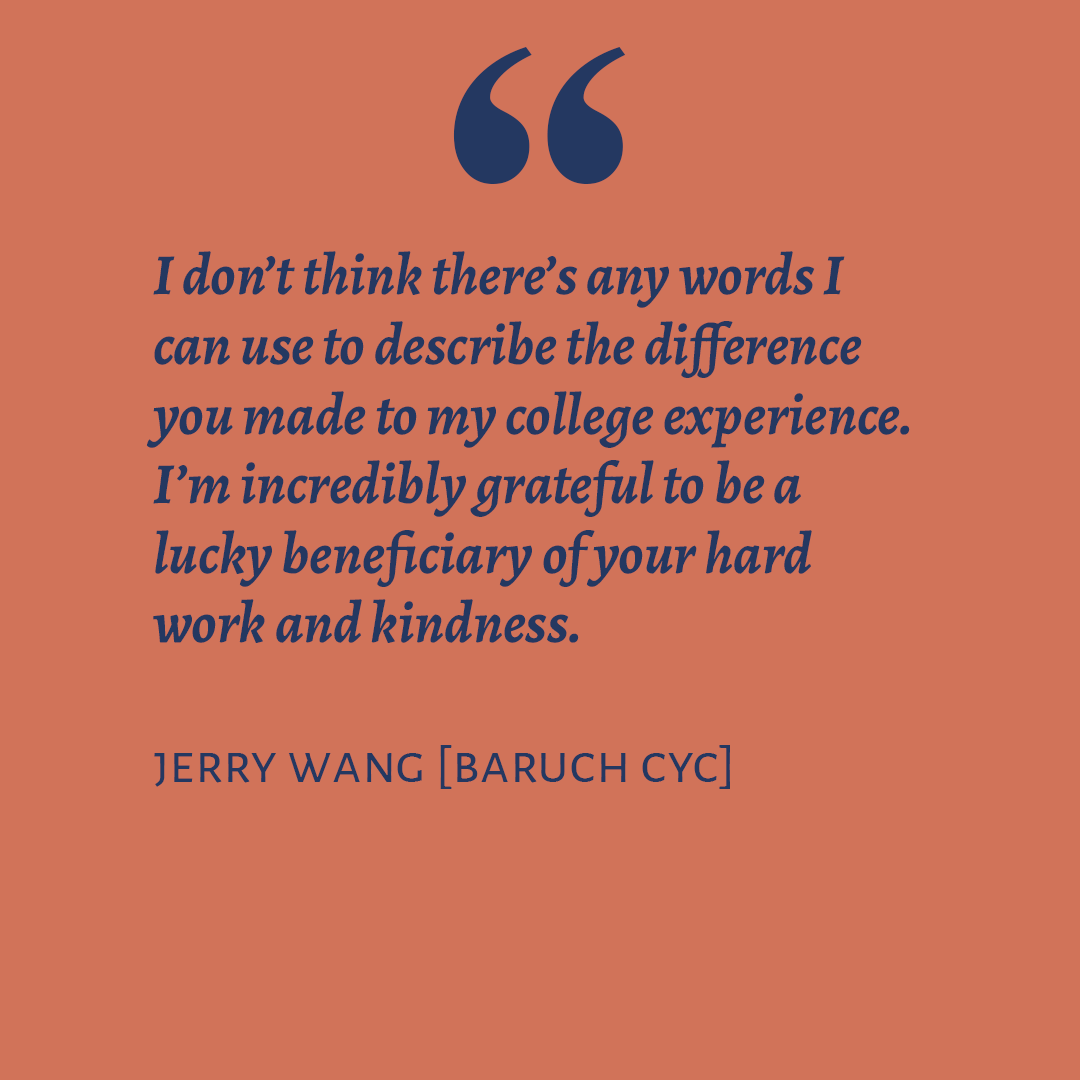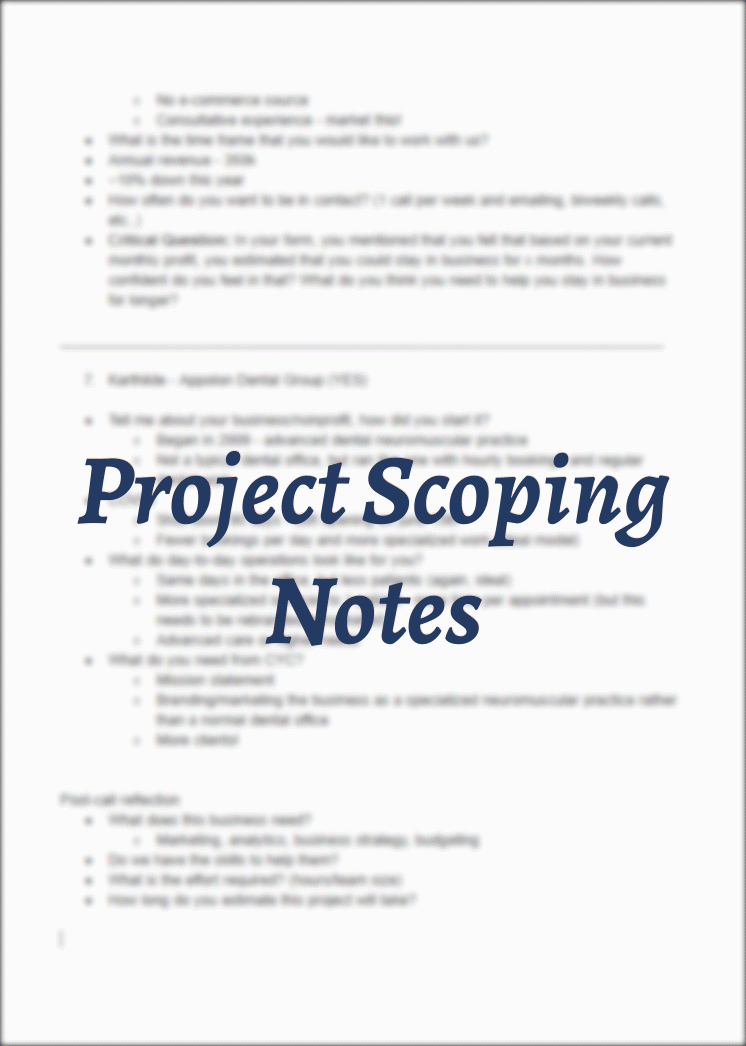
We made it our business to help them stay in business.
a 2020 Summer exclusive report
Our vision as a nonprofit is to empower every entrepreneur to have the economic freedom to pursue the American Dream. As a national pro bono consultancy dedicated to empowering women-owned and minority-owned small businesses, we wanted to use our expertise to help small businesses outlast the pandemic. This summer report is a story of how we helped two communities find meaning and purpose during a historic pandemic.
We hope this report inspires you to remember the power of human resilience and potential during challenging times. Our goal with this report is twofold:
celebrate the service of our volunteers and their impact over the summer.
share resources we customized for our volunteers to put racial equity at the core of our operations.
Our Mission
Consult Your Community’s mission is to connect small businesses with a volunteer workforce to help them achieve economic breakthrough. Ordinarily, this means undergraduate student teams at leading universities partner with local businesses during the school year for 10-12 weeks where they provide strategic and tactical assistance to grow their business on topics ranging from digital marketing strategy to business operations.
A Historic Program
In our 7 years as a 100% volunteer-led nonprofit, this was the first time we embarked on a summer program with our undergraduate volunteers. We connected small business owners in cities across America with bright undergrads who similarly faced disruption: they had their education, graduation ceremonies, and internship plans either cancelled or put on pause during this time.
What we did
A national team of 7 professionals simultaneously working full-time jobs in industries like management consulting, banking, private equity, and tech designed a small business assistance program. This team spent their summer upskilling our student volunteers through weekly coaching and 15 hours of training while simultaneously launching and running a program to help small businesses outlast the pandemic.
7 of 9 businesses who responded to our recent impact survey said that within a month, our volunteers’ work directly impacted the long term success of their companies. Many of the businesses we had scoped in june mentioned that they only expected to be able to keep their shops open for 2-3 months.
Meet Evetta Petty of Harlem’s Heaven who has designed hats for Patti Labelle and been featured in Vogue Magazine.
Meet Laura Bacon who started as a high school teacher and now helps Women of Color entrepreneurs in D.C. be the best version of themselves.
Meet Jillian Livingston whose lifestyle blog is at the heart of building a community in Aspen.
As Radhika mentions, not everyone can give money, but volunteers could give their time, expertise, and hustle. Since many businesses faced reductions in workforce, our volunteers gave these entrepreneurs helping hands they no longer had.
Riley’s team helped a local bookstore transition to an online platform by developing marketing strategies, analyzing current product offerings, and creating a pricing strategy Excel model.
This page not only celebrates a story of our volunteers’ service, but it also shares how we responded to the racial unrest in America. We made racial equity a key priority and went on a journey to transform our operations and change the way our volunteers saw the importance of their work.
Our summer was a season of grit
Not only did we focus on helping small businesses impacted by the pandemic, we saw it as our mission to respond to the incidents of racial injustice over the summer through our core work.
This work entailed pivoting our operations several times to ensure we were truly making a difference on small businesses who needed help the most. It meant reimagining the role our volunteers played in their work as an invitation to help more women-owned and POC-owned businesses. It meant deeper engagement with our volunteers to create resources that did not previously exist so we could turn racial consciousness into action through their everyday work. Finally, it meant taking a step back to realize what we had created was not built before, and that an opportunity existed to share these resources not just within our own organization but with student leaders across the country. The timeline below illustrates these pivots and showcases the volume of work a coordinated 7-person planning team leading 44 volunteers could achieve in the midst of a global pandemic, all while balancing full time jobs.


What businesses were facing in the first months of the pandemic
We surveyed 73 entrepreneurs in 32 cities within the first months of the pandemic to understand their needs. All were either sole proprietors or had <50 employees. This is what they thought about their small businesses’ prospects.
7
or ~10% of these businesses Thought their business would make it past 2020
58%
had not applied for the SBA’s payroll protection program.
62%
believed their business would go under in <6 months.
3,650
up to 3,650 employees stood to lose their jobs if these businesses closed down
% of Small Businesses expected to shut down in...
5 of the Black-owned businesses who responded to our recent survey told us our volunteers helped extend the life of their business by anywhere from an additional 2 to 12 months.
“I was literally astounded when CYC contacted Excellent Presence “cold” with the offer to help our business. Could this be real...?
Yes. It was! They enabled us to get critical work and planning done that had been backlogged for a very long time. They did great work and streamlined our efforts. Ultimately, their assistance freed a LOT of my time, affording me the mental space that allowed me to clarify our focus and better define the next steps that would carry us through the next season.
Also... there was an unexpected benefit. The past few years have been a rough period for Black lives. Even more so in 2020. I found that just having other caring, diligent humans to work with in such a difficult social climate really helped lift my spirits, motivating me to enhanced productivity — shaking me out of my reverie a bit, if you will.
All in all, the collaboration with CYC provided a fantastic starting point for us to get some crucial work done, and then gauge its impact, so I can decide how we need to move from here.”
“It is so crazy that just when one gives up and let’s go of what they have been attached to for so very long, everything clicks into place. My blog and business professional network are running strong thanks to CYC coming in to help me to do a deep dive into the infrastructure of my organization and bring clarity to my business model. I am now better equipped to build a community in Aspen. CYC filled in all the holes, expediting my progress tenfold, and for that, I am forever grateful. Now I am well on my way to reaching a dream that I have held for over 11 years, to have platforms with enormous viewership so that I may share voices, support businesses, and authentically and intentionally create community. Thank you CYC. Thank you.”
Follow us on Instagram to stay updated on our work. We will be launching a report soon capturing insights from small businesses on the frontlines on how they navigated hurdles for their business in the midst of twin pandemics—an economic one and a racial one.

Summer Impact
We sourced, scoped, and started our first wave of projects in 7 weeks.
Starting in June, our interns supported 7 business owners across 5 cities for our first wave of projects.
It wasn’t easy to source small businesses once the school year ended and our volunteers dispersed, but our team worked hard to mobilize our network. We also knew the nature of these projects would be higher stakes, given that these businesses self-reported to close down in 2-3 months without getting strategic assistance. We took the time to empathize and learn about the unique circumstances small businesses were facing through interviews.
Our program’s start coincided with the national protests in June. Even though we had a full portfolio of leads, we intentionally pivoted our initial research to source, select, and scope 100% Black-owned projects within a 2 week time frame.
This would have been impossible had it not been for 11 interns whom we asked to find 1,000 minority-owned businesses. they reached out to 1,089 contacts in 32 cities within 4 days.
We confronted the reality of the statistics that were coming in as early as June that over 50% of black-owned businesses had shut down during the pandemic. We knew we had to use our resources for a community that was hurting during this time. Some of the national team spent their 4th of July weekend scoping projects. Without their sacrifice those 2 weeks, we could not have achieved our goal of reaching these business owners.
Our volunteers were students and young professionals with full time jobs who, when faced with the option of taking it easy over an already difficult summer, instead chose to help communities in need during unprecedented times.
WE HAD 44 UNDERGRADUATE VOLUNTEERS AND 6 YOUNG PROFESSIONALS ACTING AS ADVISORS.
Our 44 undergraduates came from 18 universities, 3 of whom worked from Costa Rica, Lebanon, and the United Arab Emirates during the internship. To prepare for this opportunity, 12 of our interns embarked on a digital marketing certification by Google, collectively 480 hours of training.
In April, we assembled a 6-person planning team all with full-time work across management consulting, investment banking, private equity, and tech (Guidehouse, LEK Consulting; J.P. Morgan; Sandton Capital Partners; Google). One of our volunteers filled out dozens of PPP applications for his main job and knew what small businesses were dealing with on the frontlines.
THE WORK OUR VOLUNTEERS DID HAD THE EFFECT OF ESSENTIALLY ADDING 3 FULL TIME EMPLOYEES TO THESE BUSINESSES. SOME OF THESE BUSINESSES WERE SOLO-PRENEURS, SO THIS MEANT A 300% INCREASE IN CAPACITY.
Our volunteers worked on a broad range of work from digital marketing strategy, partnership development, and PR, to supply chain strategy and financial analysis. Each team had a national advisor, who on top of helping source and scope our 13 projects, developed and presented 14 hours of consulting skills training as an added bonus for our volunteers.
It became clear in July that we needed to act quickly if we wanted to instill a consciousness of equity across our network of 26 universities.
Even more had to be done to convert that mentality into outcomes on our operations.
Our experience sourcing the second wave of small business owners over the summer helped us recognize inherent bias in the way we as a national team thought about sourcing engagements and the way our student volunteers engage in sourcing their projects.
In early July, our CEO collected stories of bias shared by her network and distilled academic research from diversity scholars into an action plan. Meant for college students and new grads, this was a resource for those looking to make their campuses and workplaces more equitable.
It was shared over 45 times on LinkedIn, was globally trending on #diversity on LinkedIn, and liked by CEOs, VPs, and other senior leaders across consulting, tech, and banking.
Providing over a dozen visuals of conversation starters, question reframes, and process tips to combat everyday bias, the essay on “The Banality of Bias” was intended as a resource for current college students, new grads, and employees to put theory into immediate action.
After reviewing the resources shared on racial equity by diversity departments in nearly 30 universities, we realized that we were the first organization to customize guidance on antiracism for student leaders.
We are now trying new methods to get the word out, like customizing the banality of bias essay into instagram posts and a change.org petition.

In the words of Martin Luther King Jr., “those who love peace must learn to organize as effectively as those who love war.” In the spirit of that quote, two student leaders, Asma Farooqui from the University of Maryland at College Park and Kirandeep Kaur from UC Davis, worked with our CEO to create over 7 guides to embed racial equity into the fabric of our operations. leveraging the banality of bias resource, they customized this guidance for nearly every role in our nonprofit. It is now upon our student leaders to use these resources to meet the moment.
How did we pull this program off?
Six people who never met each other in real life showed the power of virtual collaboration to foster a connection
The internship program planning team was in Dallas, Los Angeles, New York City, San Francisco, and Washington D.C. The common thread between them was their experience as Consult Your Community student leaders at UC Berkeley, Columbia University, University of Texas at Austin, and the University of Maryland at College Park. They now give back to our nonprofit by volunteering on top of their full-time jobs in demanding industries.
The start of our internship coincided with the George Floyd protests over the summer. Within 3 days, we pulled together a listening session to kick off our racial justice work for the summer. Our students listened to Kimberly Lewis, the Global DEI Leader for Goodwill Industries and CEO of Goodwill East Texas, share her thoughts on the recent protests and what students could do in their projects to support the Black Lives Matter movement.
“Planning this internship is the hardest thing I’ve ever done.”
Digital collaboration tools like Asana and Google’s G Suite were key to design a program that helped us manage the volunteer equivalent of nearly 20 full time staff.
Rohan Trivedi, a recent graduate and former student leader at the University of Texas at Austin, supported the Intern Planning team while also serving as a project manager for a small business this summer.
It took a lot of heart and sacrifice to make sure our small business assistance program was a success.
“Through this internship we closed the gap between students and small businesses, empowering both of them during a time of uncertainty.”
Katie Sheldon, also a former student leader at the University of Texas at Austin chapter, now works at Cisco in Supply Chain. At a panel discussion at Cisco to over 400 attendees, she recently shared her experiences helping our nonprofit navigate our pandemic response.
“As a member of the Internship Planning team, CYC entrusted me with responsibilities such as conducting scoping calls with potential clients, and to my surprise, deciding who was best fit for the program. I selected a cohort optimizing for racial equity in who we served in our summer program. This meant prioritizing Black small business owners because I wanted to emphasize CYC’s solidarity and support for the Black community, especially during this time. CYC will continue to place importance on supporting Black lives in every way that we can as we expand to serve more clients.”
Their dedication and results in 2 weeks are a reminder to leaders of organizations of all sizes that representation must be made a priority in order to ensure outcomes of racial equity.
When our team made the hard pivot to make sure our second wave of projects for the summer would exclusively help Black-owned businesses, we moved quickly on a tight timeline. When some small businesses were only available for calls during the week and weekend of July 4th, Aneesah and Anne still chose to make the time. They got on the phone to talk to entrepreneurs across the country and conduct detailed scoping interviews. With their hustle and dedication, we achieved our goal of sourcing 100% black-owned businesses for all new projects.
“Personally, this internship was one of the most difficult and rewarding things I partook in in my nearly 5 years at CYC. Each and every volunteer and client was probably dealing with unique struggles that nobody else could truly fathom, yet everybody came together to deliver a more successful pilot internship program than we could ever have imagined. This makes me hopeful that, whatever challenges the world may bring us in the months and years to come, we’d be able to take on all of them.”
We are lucky our team has learned to create a virtual culture over 5 years. In some ways, our nonprofit operates like a business founded and run by our chosen family.



































